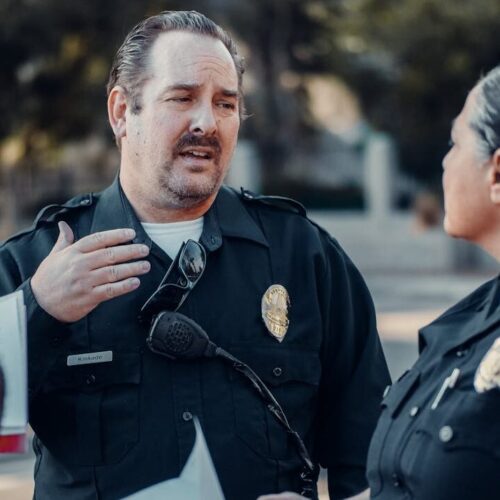Mental Health Training: Strategies for Small and Rural Law Enforcement Agencies
Mental Health Training: Strategies for Small and Rural Law Enforcement Agencies
Small and rural jurisdictions, which make up the majority of police departments across the country, often face distinct challenges that make it difficult to implement the types of mental health training programs that larger and urban agencies can access. Given this, even when there is strong support for using best practice approaches in response, police officers in these jurisdictions often have fewer options for cross-system training and when responding to people in crisis. This brief details strategies for small and rural law enforcement agencies to develop and implement comprehensive, high-quality training that creatively addresses their unique challenges. These strategies are intended to help officers effectively respond to people who have mental health needs and connect them to necessary services. Photo credit: Photo by Kindel Media from Pexels
Mental Health Training: Strategies for Small and Rural Law Enforcement Agencies
Many law enforcement agencies throughout the country have strong partnerships with health care providers and other community-based organizations to improve responses to people experiencing mental health crises. These partnerships have often led to mental health training opportunities for officers and an increase in the number of first responder teams—such as co-responders and mobile crisis teams.
However, small and rural jurisdictions, which make up the majority of police departments across the country,¹ often face distinct challenges that make it difficult to implement the types of mental health training programs that larger and urban agencies can access—beginning with a lack of local mental health providers to partner with.² In fact, more than 85 percent of federally designated “mental health professional shortage areas,” are rural,³ and counties that are rural and low-income have the least amount of mental health professionals per capita.4 Given this, even when there is strong support for using best practice approaches in response, police officers in these jurisdictions often have fewer options for cross-system training and when responding to people in crisis.
This brief details strategies for small and rural law enforcement agencies to develop and implement comprehensive, high-quality training that creatively addresses their unique challenges. These strategies are intended to help officers effectively respond to people who have mental health needs and connect them to necessary services.
Unique Challenges to Delivering Mental Health Training
Smaller agencies are making great strides to train their staff, but they face unique challenges:
Funding: Less populated towns have limited tax bases, meaning less funding to provide officers specialized training.5
Support Resources: Often lacking their own training academies, small and rural jurisdictions can have limited community resources with which to partner,6 and many areas have unreliable internet or less access to other technologies for virtual trainings.
Staffing: With limited staff, small agencies may need to prioritize patrol coverage over training.7
Geographic Location: Location, time, and distance must be considered when planning regional training. Specialized training often requires officers to travel, straining small agencies that must backfill positions or pay overtime when officers are out.8
Mental Health Training Principles
While agencies should customize trainings based on community need and available resources, several principles should also guide their delivery. These include ensuring officers receive useful and practical information that reflect their real-world experiences. Below are three important principles to remember— mental health training should be:
Comprehensive: Training must help officers understand the overall landscape of mental health needs and available resources in their communities, as well as response options for specific scenarios.
Consistent: Agencies should establish a minimum number of training hours for every officer or follow the state requirements (if applicable).9 They should also create clear requirements for ongoing training to keep current on the latest research and best practices.
Impactful: Trainings should be practical and incorporate classroom time as well as scenario-based training and other opportunities for officers to use skills in real-world scenarios. Agencies should also regularly collect data and feedback to evaluate their training efforts and use this information for future improvement.
Three Key Strategies for Effectively Implementing Mental Health Training
1. Forge community partnerships to expand training access, capacity, and resources.
To minimize overtime costs or staff shortages during training, agencies can partner with other law enforcement to provide shift coverage.10 Additionally, community agencies such as fire departments, emergency medical services, probation, and parole also likely deliver their own mental health trainings and can be of help for cross-agency training assistance. Hospitals are also often a good partner to seek out since they are typically the primary provider for mental health services in rural communities. Trainers can be identified through hospitals, among local doctors, and within the state behavioral health agency to help increase officer awareness on topics such as Mental Health First Aid for Public Safety or the local Crisis Intervention Team (CIT) approach.
Free training resources can be provided by partners such as the National Alliance on Mental Illness’s (NAMI) state or local affiliates. If an agency cannot send officers to a centralized police academy, these partnerships can be leveraged to host joint trainings at closer venues, including public spaces such as libraries, places of worship, or community centers that may donate the use of rooms. These partnerships can also serve to sustain community buy-in and provide additional perspectives to problem solve crisis intervention challenges.
2. Consider varying training methods.
Given capacity and time constraints, many rural and small law enforcement agencies will need to offer a variety of training methods for their staff to be able to complete at different times. Electronic programming can be an easier way to provide trainings; some established programs make their trainings freely available online so that officers can adapt them to the specific needs of their department. While necessary technology, like broadband internet, must be in place for these options, they can be a useful resource for agencies in need of more training flexibility. Hybrid models, incorporating both remote and in-person training, can allow for flexible scheduling and decrease capacity constraints. Agencies can also consider shorter training schedules, such as allowing officers to complete scenario-based training in 10-minute blocks during shift briefings, or as time and budget allow.
3. Seek out federal, state, and local funding.
Federal grants are available through the U.S. Department of Justice’s Bureau of Justice Assistance, as well as the Department of Health and Human Services. The American Rescue Plan also has funding for local governments to expand mental health services, which could include law enforcement training. State funding may be provided through state-specific legislation, or through the appropriate state administering agency, state mental health authority, or state substance addiction agency, as a pass-through entity for federal block grant funding. Additionally, private entities such as large health care providers, hospitals, local corporations, or philanthropic groups may have private grant or partnership opportunities.11
Example of Success
As part of a goal to expand a co-responder model more broadly and inclusively in Washington County, VT, the Montpelier, VT Police Department and Washington County Mental Health officials developed a training for first responders that brings together police, mental health crisis clinicians, fire department personnel, emergency medical services (EMS), 911 dispatchers, and at times, states attorneys to engage in a one-day, scenario-based training called Team Two. Due to the rural nature of Vermont, a 40-hour CIT training is extremely difficult for police departments and EMS personnel to attend, so the 8-hour training is offered as an alternative to a full-length CIT curriculum. Collaboration with hospital emergency departments, local mental health agencies, and NAMI Vermont allows participants in the training to learn each other’s language and limitations in responding to a mental health crisis. Team Two is currently expanding to incorporate more EMS providers and peer advocates.
Endnotes
1. Almost two-thirds of law enforcement agencies serve communities with less than 50,000 residents, and about half (54 percent) serve less than 10,000 residents with fewer than 10 officers. See Federal Bureau of Investigation (FBI), Police Employee Data (Washington, DC: FBI, 2018), Table 74: Full-time Law Enforcement Employees by Population Group Percent Male and Female 2018,
https://ucr.fbi.gov/crime-in-the-u.s/2018/crime-in-the-u.s.-2018/topic-pages/police-employee-data; Brian Reaves, Local Police Departments, 2013: Personnel, Policies, and Practices (Washington, DC: Bureau of Justice Statistics, 2015), https://www.bjs.gov/content/pub/pdf/lpd13ppp.pdf.
2. International Association of Chiefs of Police, Policing in Small, Rural, and Tribal Communities. Practices in Modern Policing (Alexandria, VA: International Association of Chiefs of Police, 2018), https://www.theiacp.org/sites/default/files/2018-11/IACP_PMP_SmallTribal.pdf.
3. U.S. Department of Health and Human Services Health Resources and Services Administration Office of Rural Health Policy, Mental Health and Rural America (Washington, DC: Department of Health and Human Services, 2005), https://files.eric.ed.gov/fulltext/ED591902.pdf.
4. Alan R. Ellis et al., “County-Level Estimates of Mental Health Professional Supply in the United States” Psychiatric Services 60, no. 10 (2009): 1315–1322, https://ps.psychiatryonline.org/doi/full/10.1176/ps.2009.60.10.1315.
5. Faye Elkins, “Concerns of Rural Law Enforcement: What We Heard from the Field” Community Policing Dispatch 12, no. 8 (2019), https://cops.usdoj.gov/html/dispatch/09-2019/rural_le.html.
6.Alex Neuhoff and Andrew Dunckelman, “Small but Tough: Nonprofits in Rural America” (Boston: The Bridgespan Group, 2011), https://www.bridgespan.org/insights/library/funding-strategy/small-but-tough-nonprofits-in-rural-america.
7. International Association of Chiefs of Police, Policing in Small, Rural, and Tribal Communities. Practices in Modern Policing; International Association of Chiefs of Police, Emerging Trends and Issues in Smaller Law Enforcement Agencies (Alexandria, VA: International Association of Chiefs of Police, 2015), https://www.theiacp.org/sites/default/files/all/s/SmallerAgencyFocusGroupReport.pdf.
8. Jeffry Sale, National Summit: Small and Rural Law Enforcement (Washington, DC: National Institute of Justice’s Rural Law Enforcement Technology Center, 2009), https://www.ojp.gov/pdffiles1/nij/233949.pdf.
9. Many states have set a standard for minimum hours of mental health training through statute. See, “Law Enforcement Training,” National Conference of State Legislatures, accessed March 31, 2022, https://www.ncsl.org/research/civil-and-criminal-justice/law-enforcement-training.aspx.
10. Katie Holihen, Jason Stamps, and Shaza Loutfi, Park Ridge’s Success Story on Going Beyond Crisis Intervention Team Training: Building Whole-Community Responses to Mental Health (Washington, DC: Office of Community Oriented Policing Services, 2018), https://cops.usdoj.gov/RIC/Publications/cops-w0856-pub.pdf.
11. Therese Matthews, “Grants for police mental health outreach programs,” Police1.com, May 13, 2019, accessed July 27, 2021, https://www.police1.com/police-grants/articles/grants-for-police-mental-health-outreach-programs-4edCbvmO1udNRinJ/.
Request Free Support
The Council of State Governments Justice Center offers free in-depth subject matter expertise and can connect you to communities that are currently implementing some of these approaches. Visit the Law Enforcement-Mental Health Collaboration Support Center to learn more.
Additional Resources
The Police-Mental Health Collaboration (PMHC) Self-Assessment tool by the CSG Justice Center
Free Roll Call Mental Health Training Series for Police Departments Across the Country by The Guidance Center
Connecting People Who Have Serious Mental Illnesses to Care—Telehealth and Other Strategies
This project was supported by Grant No. 2019-MO-BX-K001 awarded by the Bureau of Justice Assistance. The Bureau of Justice Assistance is a component of the Department of Justice’s Office of Justice Programs, which also includes the Bureau of Justice Statistics, the National Institute of Justice, the Office of Juvenile Justice and Delinquency Prevention, the Office for Victims of Crime, and the SMART Office. Points of view or opinions in this document are those of the author and do not necessarily represent the official position or policies of the U.S. Department of Justice.
Project credits:
Writing: Amelia Vorpahl and Julia Kessler, CSG Justice Center
Research: Terence Lynn, Amelia Vorpahl, and Julia Kessler, CSG Justice Center
Advising: Sarah Wurzburg, CSG Justice Center
Editing: Darby Baham, CSG Justice Center
Design: Michael Bierman
Web Development: Catherine Allary, CSG Justice Center
About the authors


The sharp rise in school shootings over the past 25 years has led school officials across the U.S.…
Read MoreA three-digit crisis line, 988, launched two years ago to supplement—not necessarily replace—911. Calling 988 simplifies access to…
Read MoreIt would hardly be controversial to expect an ambulance to arrive if someone called 911 for a physical…
Read More Taking the HEAT Out of Campus Crises: A Proactive Approach to College Safety
Taking the HEAT Out of Campus Crises: A Proactive Approach to College Safety
The sharp rise in school shootings over the past 25 years has…
Read More From 911 to 988: Salt Lake City’s Innovative Dispatch Diversion Program Gives More Crisis Options
From 911 to 988: Salt Lake City’s Innovative Dispatch Diversion Program Gives More Crisis Options
A three-digit crisis line, 988, launched two years ago to supplement—not necessarily…
Read More Matching Care to Need: 5 Facts on How to Improve Behavioral Health Crisis Response
Matching Care to Need: 5 Facts on How to Improve Behavioral Health Crisis Response
It would hardly be controversial to expect an ambulance to arrive if…
Read More













